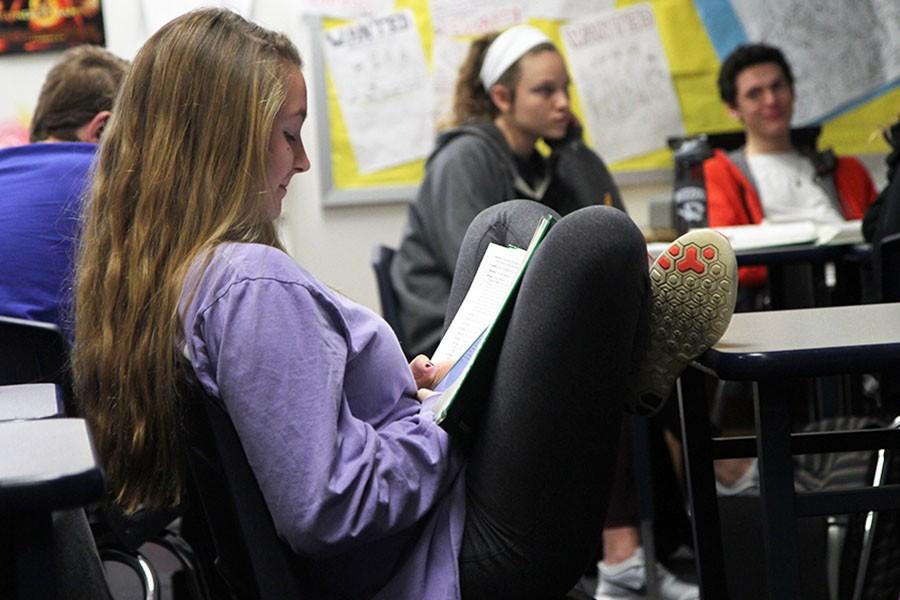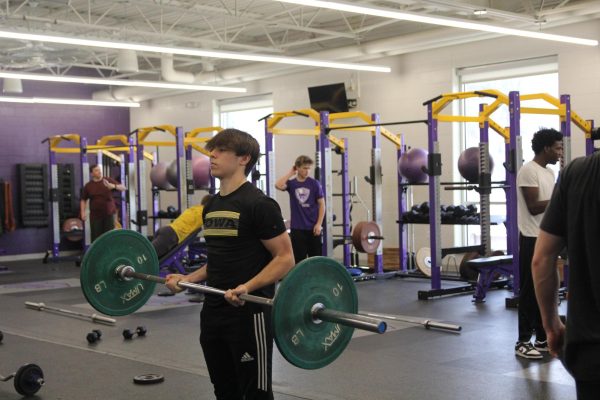Disconnected engagement
Students navigate how to balance life on and off the screen
Kylee Bowling (9) uses her phone during a lesson on Shakespeare in Mr. Keith Pardeck’s 3rd hour Language Arts 9 Honors class, March 4. “I took notes on my phone because I do not have a Language Arts notebook, but I definitely could have misused that privilege.”
The nature of socializing has evolved from handwritten letters, face-to-face conversations and phone calls to small groups of people talking all day without ever opening their mouths or seeing each other faces in just three decades.
Group texting apps such as GroupMe and WhatsApp have changed the way teenagers communicate replacing technologies like email, texting, instant messengers and even facebook.
With a smartphone in everyone’s pocket, the process of setting up group conversations is easier than ever. Even social media apps like Instagram, Facebook, and Twitter feature built in group conversations.
A poll on the EHS-hub Twitter account asked students how many group conversations they were in. Out of the 63 students who answered the poll, 83 percent said they were active in three or more group conversations.
Group conversations connect groups of different sizes, and with those larger conversations comes the greater likelihood of miscommunication.
“There are always going to be disagreements when you get people in a group together,” Ashlyn Koob (11) said. “There will always be some opinions that don’t work together.”
Just because people can engage in group texts doesn’t mean they know how. Feelings can easily be hurt.
“What’s said is often times taken out of context,” Mr. John Wunderlich, guidance counselor, said. “I could be saying it in a sarcastic way. I could be saying it in a joke. You know there is a lot of ways I could say a statement, and you wouldn’t gather the meaning without getting the verbal or physical cues that you would get in a face-to-face conversation.”
Jokes are often taken too far.
“I had to play the game ‘Odds Are’ which is like a truth or dare type of situation, and one of them was to say something about my friend’s girlfriend, like a joke, and it was funny, but I did take it too far,” Joey Owens (12) said.
Learning when to group text could be the difference between contentment and frustration.
“It’s constantly going off, like when you are doing your school work, and your phone is constantly buzzing because it never really stops,” Koob said.
Arguments in group conversations can stem from anything.
“We got heated up when we were trying to decide prom tables,” Charles Gaugh (11) said. “We got bored during my fourth hour, and we just started yelling at each over text, like who should sit where.”
Students have left group conversations for reasons ranging from the people in them sending too many texts to outgrowing groups.
“High school’s fun, but sometimes you change opinions or views on life and lose friends,” Owens said. “I had an old friend group I didn’t want to hang out with anymore. I had to leave them, and sometimes that is hard to do, but it’s necessary.”
Basic ground rules can help.
“I rarely have disagreements. In the type of group texts I’m in, it’s usually for work or a team of some kind,” Daniel Trask (11) said. “We usually keep it pretty civil.”
However, there are triggers that can annoy people in a group conversation and cause them to put the phone down.
“Sometimes if someone is going on a tangent or having an individual conversation in the group, it’s kind of annoying,” Trask said. “So your phone is just buzzing and buzzing, but you can’t mute it because it’s important, so you have to sit through all the annoying stuff.”
Conflict within groups are not the only issue. Group texts can easily turn into a raging rumor mill. This was evidenced in the event that occurred two months ago with threat of violence made against the school.
Mr. Charles Crouther issued a statement on the threats, Feb. 10. Students took to their groups to ask and try to find out what exactly was going.
“I heard it on social media – I saw a couple of things on Twitter,” Owens said. “My first instinct was to ask my friends, so I sent a text in a group message asking what was going on.”
The situation was not helped by the amount of false information being spread about the when, where, why and how of the threat. Students and parents alike saw several posts on either social media or in their group conversations, and spread what they believed to be true only further bending the truth.
“Without intent, it just does change,” Mrs. Becky Reat, PTO president, said in a phone interview conducted, March 10.“It’s like the telephone game that you play where you start with one sentence and, by the time it goes around the circle, it’s an entirely different sentence.”
Rumors are spread, too, often involving hurtful or demeaning statements about others.
“Just this morning I dealt with some rumors that were spread,” Mr. Wunderlich said. “A student made a joking statement via text message and was completely kidding around. Well then that student passed that text message onto another student, and it spread like wildfire.”
The best defense against such information lies in the students themselves, as they have the ability to stop the information before it is spread by denying or refusing to spread it.
Resistance might be hard to do, though.
“It’s kind of like a group mentality where someone starts saying something, everyone starts saying that thing as well,” Koob said.
Counselors are ready to help, and there are school rules and policies guiding disciplinary situations.
“Our litmus test for that is we have technology requirements, and we have policies in place that discipline students for breaking our technology policy,” Mrs. Jennifer Strauser, associate principal, said. “We also have disruption of the school environment policies, so if students do something, however they do it and whatever they do, then they are disciplined according to that policy.”
Students can empower themselves to stop hurtful things from being said and accommodate each others’ differing opinions and views.
“It’s a super important thing to remember that there are people, emotions and feelings related to whatever you’re talking about. It’s easy to say hurtful things and spread rumors when you aren’t face-to-face with the person,” Mrs. Strauser said. “You are detached from them, only connected by phone. The only thing looking back at you is your face in the reflection on your screen on your phone.”
Your donation will support the student journalists of Eureka High School - MO. Your contribution will allow us to purchase equipment and cover our annual website hosting costs.

This is Tyler’s third semester on the EHS hub staff. He is the technology section Editor. You can follow him on twitter @tpriceEHS_hub. His hobbies include...





















